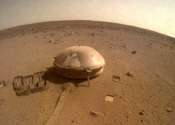Orionids Meteor Shower Lights Up the Sky
Earth is currently passing through a stream of debris from Halley's Comet, lighting up the night sky with the "fireworks" of the annual Orionids meteor shower.

Earth is currently passing through a stream of debris from Halley's Comet, lighting up the night sky with the "fireworks" of the annual Orionids meteor shower.
Space Exploration
Oct 21, 2009
0
0

Earth is entering a stream of dusty debris from Comet Swift-Tuttle, the source of the annual Perseid meteor shower. Although the shower won't peak until August 11th and 12th, the show is already getting underway.
Space Exploration
Jul 31, 2009
2
0

We've all read the advice that during a meteor shower there is no equipment needed. All you need to do is lay back and wonder at one of the most spectacular sights the universe has to offer. That's about it though and while ...
Space Exploration
Aug 13, 2024
0
7

Since 2018, NASA's InSight mission to Mars has recorded seismic waves from more than 1,300 marsquakes in its quest to probe the internal structure of the red planet. The solar panels of the car-sized robotic lander have become ...
Planetary Sciences
Sep 20, 2022
0
4

Telescopes have captured meteoroids hitting the Moon and several spacecraft imaged Comet Shoemaker–Levy 9 smacking into Jupiter in 1994. But impacts as they happen on another rocky world have never been observed.
Space Exploration
Feb 3, 2021
0
28

Physicists from the Higher School of Economics and Space Research Institute have identified a mechanism explaining the appearance of two dusty plasma clouds resulting from a meteoroid that impacted the surface of the moon. ...
Space Exploration
Jan 25, 2019
1
22
A meteoroid exploded over the city of Lipetsk in western Russia last week without warning, lighting up the summer sky with a bright flash. While some enjoyed the light show, others are worried that we didn't see it coming.
Space Exploration
Jun 29, 2018
0
22
The annual Perseid meteor shower is one of the best and most reliable meteor showers of the year. It peaks every year around the 12th/13th August, and under ideal conditions produces a maximum frequency of meteors, or zenith ...
Space Exploration
Jul 29, 2015
0
72

The weak display of last month's Camelopardalids meteor shower, the result of the close passage of comet 209P/LINEAR, may have disappointed backyard observers, but this never-before-seen shower now has scientists excited. ...
Space Exploration
Jul 23, 2014
0
0

In astronomy, there's nothing quite like a bright meteor streaking across the glittering canopy of a moonless night sky. The unexpected flash of light adds a dash of magic to an ordinary walk under the stars.
Space Exploration
Jul 30, 2013
0
0